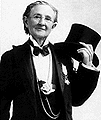Dr. Mary Edwards Walker - Surgeon, Spy, Suffragette
Prisoner of War, Proponent of Style and Congressional Medal of Honor Winner

Dr. Mary E. Walker, M.D., a Civil War physician,
was awarded the Congressional** Medal of Honor in 1865.
Dr. Walker's Medal of Honor was rescinded in 1917, along with some 900 others. Some believed her medal was rescinded because of her involvement as a suffragette. Others discredit that opinion as 909 other medals rescinded were awarded to men. The stated reason was to ". . . increase the prestige of the grant."
For whatever reason she refused to return the Medal of Honor and wore it
until her death in 1919. Fifty-eight years later, the U.S. Congress posthumously reinstated her medal, and it was restored by President Carter on June 10, 1977.
She is the only woman of the Civil War, or any war, to have been
awarded the Medal of Honor.

Citation for the Congressional Medal of Honor:
Whereas it appears from official reports that Dr. Mary E.
Walker, a graduate of medicine, "has rendered valuable
service to the Government and her efforts have been earnest
and untiring in a variety of ways," and that she was
assigned to duty and served as an assistant surgeon in
charge of female prisoners at Louisville, Ky., upon the
recommendation of Major Generals Sherman and Thomas, and
faithfully served as contract surgeon in the service of the
United States, and has devoted herself with much patriotic
zeal to the sick and wounded soldiers, both in the field and
hospitals, to the detriment of her own health, and has also
endured hardships as a prisoner of war four months in a
Southern prison while acting as contract surgeon; and
Whereas by reason of her not being a commissioned officer
in the military service, a brevet or honorary rank cannot,
under existing laws, be conferred upon her; and
Whereas in the opinion of the President an honorable
recognition of her services and sufferings should be made:
It is ordered, That a testimonial thereof shall be hereby
made and given to the said Dr. Mary E. Walker, and that the
usual medal of honor for meritorious services be given her.
Given under my hand in the city of Washington, D.C., this 11th
day of
November, A.D. 1865.
Andrew Johnson, President

Even in uniform Dr Mary Walker was controversial - she added trousers under her skirt, wore a man's uniform jacket and carried two pistols at all times. Her military career was not actually military in that she was never commissioned. She was refused a commission as
an army surgeon, but served on a volunteer basis at a Washington D.C. hospital.
She worked as a field surgeon near the Union front lines for almost two
years (including Fredericksburg and in Chattanooga after the Battle of
Chickamauga), then was appointed assistant surgeon of the 52nd Ohio
Infantry. After spending four months in a Richmond prison, she was released
back to the 52nd Ohio as a contract surgeon, but spent the rest of the war
practicing at a Louisville female prison and an orphan's asylum in
Tennessee. During her stay with the 52nd Ohio it is implied that she also served as a spy while wandering out in to the civilian community to treat the sick and starving.
Her official "service record" reads as follows:
Dr. Mary E. Walker (1832 - 1919)
Rank and organization: Contract Acting Assistant Surgeon
(civilian), U. S. Army.
Places and dates:
Battle of Bull Run, July 21, 1861
Patent Office Hospital, Washington, D.C., October 1861
Following Battle of Chickamauga, Chattanooga, Tennessee
September 1863
Prisoner of War, Richmond, Virginia, April 10, 1864 -
August 12, 1864
Battle of Atlanta, September 1864.
Entered service at:
Louisville, Kentucky
Born: 26 November 1832, Oswego County, N.Y.
Edwin M. Stanton, Secretary of War, wrote of Dr. Walker:
"She lived a life of determined unconventionality; being a bloomerite
from her younger years, she preferred to dress in pants. Later on in life,
still practicing medicine, she could be seen wearing men's top hats and top
coats as well as pants."

Dr Mary Walker was a bright and determined female patriot who was way ahead of her time. She fought to save lives, fought to gain approval, and met with resistance not unlike that being heaped upon women in the military today. The war left her scarred both physically and emotionally - but she continued to strive for women's rights for many years. And sadly she died alone, and almost penniless, at the age of eighty seven - and was not remembered for her service to her country as much as she was remembered for being "that shocking female surgeon in trousers!"

**In the 1860s it was called the Congressional Medal of Honor. Today the correct term is "The Medal of Honor".




